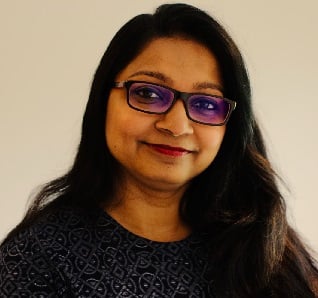
Smart energy policy flows from smart research
The UK energy system is changing. Government has committed to net zero carbon emissions by 2050 to help tackle climate change, and is investing in 'smart' technologies - aimed at maximising the security, flexibility, and sustainability of energy systems.
But in an area as fast-paced and dynamic as energy, how do policy makers decide what makes one intervention 'smarter' than another? How do policy makers ensure public expenditure delivers the best outcome?
Oxford researcher Sivapriya (Priya) Mothilal Bhagavathy is working in partnership with the Smart Energy Innovation team, in the Science and Innovation for Climate Change Directorate, within the Department for Business Energy and Industrial Strategy (BEIS) to do just that.
The team has created an evidence-based method for assessing and evaluating the impact of smart energy projects – to ensure fair and consistent decision-making. As part of this, they developed new metrics and weightings for measuring the impact of energy projects, informed in part by the outcomes of previous projects and the objectives of the programme. Priya will also deliver a report with recommendations on areas for future intervention to accelerate the journey towards net zero emissions.
For a lot of people, research and policy tend to exist in different worlds, but I have always wanted my research to be used by policy makers and others to deliver public benefit at the earliest opportunity
Materials were delivered to a tight deadline, to enhance BEIS’s submission for the 2021 Comprehensive Spending Review – the process Government uses to decide funding for each department over the next four years. It is a critical milestone, with up to £70 million awarded to smart energy innovation the current spending cycle.
The project brought together academics, industry experts and policymakers in one co-ordinated programme. It was made possible by an Oxford Policy Engagement Network (OPEN) Fellowship, funded through the University’s allocation from the Higher Education Innovation Fund. It was supported by the Energy and Power Group at the School of Geography.
Priya said there are three key reasons for success:
There’s no point in trying to "sell" science; you really need to understand what policymakers are trying to achieve and the challenges and constraints they face
Open communications
The project involved a diverse group of stakeholders, including the Head of Smart Energy Innovation at BEIS, individual teams responsible for evaluation and planning, as well as contractors and industry partners. Priya prioritised building trusted relationships. She organised a workshop with BEIS to identify the most difficult challenges faced by the department, and built a culture based on listening, working to a shared objective, sharing progress, and seeking feedback. 'The most important thing is to approach people with questions, in the first instance, rather than answers,' said Priya. 'There’s no point in trying to "sell" science; you really need to understand what policymakers are trying to achieve and the challenges and constraints they face.'
Agile approach
'The pace of the policy world is less predictable than that of research, and largely outside your control – and sometimes you end up having to put in long hours to get the job done. I think you should be prepared to put in that many hours when funded by a commercial partner, or government body. In my case, there was a lot of pressure working towards the Comprehensive Spending Review. It’s good to work with policy partners in a way that is agile, and where you can change priorities as you go, because you cannot plan absolutely everything in research,' said Priya. Working in a diverse team, Priya implemented a programme management approach called "The Theory of Change" – where groups define long term goals and then work backwards to identify the best actions to achieve them. This kept multiple stakeholders engaged with all aspects, and decisions made in the project.
I am thrilled to be working on this project, which isn’t just research, it’s shaping where the policy goes in the future
Focus on impact
With relationships and processes in place, Priya was able to use her expertise to develop an approach that connected policymakers with the best available evidence to inform policy-making on smart energy. 'It's really important to work closely with teams to ensure that the work you do is meaningful and adds impact,' she said. 'I also gained a lot from regularly sharing progress updates to show results and maintain support.' 'For a lot of people, research and policy tend to exist in different worlds, but I have always wanted my research to be used by policy makers and others to deliver public benefit at the earliest opportunity.'
'I am thrilled to be working on this project, which isn’t just research, it’s shaping where the policy goes in the future – based on where the impact has been in the past.'
